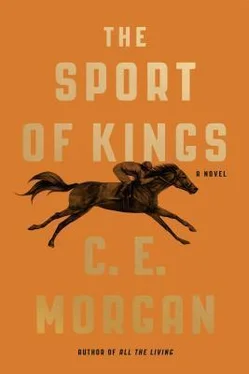Bearing the mewling child carefully away from his body, as if he were a fresh-baked loaf from the oven, Henry ascended the evening-strewn stairs. He peered down his own hall, which had once held his wealth but now only echoed his bankruptcy. He remembered purchasing the Oushak on the floor; had he really spent the precious moments of his life in a store purchasing a rug? And here was his daughter’s room, which had once been his and his father’s before him and before him NONONONONONOSTOP
Time, that old murderer, was now the room’s only occupant.
Henrietta’s beingness, her recency was lodged in every object; it permeated the air. Henry took dazed survey of his newly unfamiliar surroundings, and an old, confounding gear ground into motion: life would continue on somehow, but as long as Henry lived, rotary grief would come round again and again like a nail on a wheel.
He moved at a stuttering pace along Henrietta’s bookcases, tracing a single finger over the spines of books that had furnished her life — scriptures to which he had given no prior thought. Bartram, Lyell, The Birds of Kentucky, The Descent of Man, The Diversity of Life . He hesitated over a uniform row of black, unmarked spines, her old notebooks. He touched one lightly as if touching a relic, then slid it free. First arranging his sighing, squeaking grandson on the bed, Henry eased onto the bed beside him and read sentences at random:
Shy fish and bold fish; inborn temp; Journal of Fish Bio; Apr 2003. Are genes determinants, or are they merely expressed? Black box or …
For a long time, I thought I was nominally a body, really just Father’s idea, a meme produced by his brain. But no one can invent a human wholesale. Why else would we have invented a god? Being is too great for a single mind, because it did not emerge from a single mind. Mind itself is an epiphenomenon of changing nature and the contingencies of history. That’s why I don’t know if I am free, or to what degree I can experience freedom.
Having found the generation distance between A and B via a particular common ancestor, calculate that part of their relatedness for which that ancestor is responsible. To do this, multiply ½ by itself once for each step of the generation distance. —R. Dawkins
Am not the center of the universe. Am a speck of matter so minuscule as to be almost nothing — a no thing, less than a no thing, a space between subatomic particles, which have no name and are themselves divisible into infinity and forever vibrating.
Is there a difference between happiness and joy, and why can I feel neither?
The appearance of man is the last phenomenon. — Lyell
What strange creature had jotted down these notes? Henry held the notebook away from him in consternation as he disentangled the scratchy, idiosyncratic cursive of a girl pulled out of school just as her formal education had begun. Yes, it was Henrietta’s hand, but … who exactly was that?
He realized with a start that death and perfection could not both exist.
He gazed down at the baby. This child had killed his daughter, this dark thing, this emblem. The old hateful designation tried to return, but it was distorted by distance, wriggling in the heat of time. It still lived in Henry’s heart, but not in his mouth. This was his … grandson? God, how he wanted to hate him! Henry’s mind fumbled, and there was a panic born of loss and change. Was there some other word — a replacement — for the strangeness, the difference, the not Henry? He didn’t know. It occurred to him that it wasn’t really a problem of words.
For the first time in his life, questions yawned before him like open graves.
“Henry Forge! Henry Forge!”
His old man again, forever angry about something, yelling up from the foot of the stairs. Henry snatched up the sleepy baby and rushed to the landing, an argument already rising like a bruise on his teenaged lips, ready to shout or spit or draw his bow—
“Henry Forge!”
It was Ginnie Miller from across the road, no longer a redheaded child in pigtails but a woman well into middle age, standing with one foot planted on the first step and holding a foil-wrapped casserole in both hands. Her hair was all gray curls about her pink, farm-worn face, but her eyes were the same piercing blue of so many years ago. Without apology, as if it hadn’t been years since they last exchanged words, she announced, “Henry, I just let myself in when no one answered. My husband said I should leave you be since you’re probably exhausted, but when I heard there wouldn’t be people over after the funeral, I thought, that can’t be right. It’s not good for you to be locked up in this big house all alone. You need to keep your strength up what with— Ooooooh!” Her remonstration collapsed into a soft cry. She deposited the casserole on the second step and hurried up the steps with her arms outstretched. “Oh my goodness, here he is…!” She swept the chubby swaddling right out of Henry’s arms, gazed down rapturously, then cocked her head slightly. “Why … well, you’re not exactly what I was expecting, but…” A slightly perplexed smile wavered on her lips, then broadened: “Oh, aren’t you just the most perfect little man! So handsome — just look at him, Henry — isn’t he just perfect?” With a kiss to his downy forehead, Ginnie ferried him down the staircase and over her shoulder said, “What’s his name?”
Henry peered at her from deep within the geography of his shattered mind. He shook his head faintly.
“Well, there’s no rush, I suppose,” Ginnie said. “The right name will come when it comes. Until then, I simply can’t allow you to eat alone. In fact, why don’t we just go over to the house. Leave the casserole. There’s plenty more where that came from.”
Henry wanted to retreat — his whole body was an open wound without hope of a scab — but he lacked the strength or volition to withdraw; he allowed Ginnie to guide him through his own front hall, down the sloping lawn of his childhood, across the black ribbon road to the Miller property. He hadn’t set foot on their land since he was ten. God, had he once been a little boy with a father and a mother still alive? The years had flung themselves past him with stunning certitude and no mercy at all.
“Go right on in,” said Ginnie, bracing the screen door with her shoulder while snuggling the now sleeping child against her chest. Henry did as he was told and saw the inside of his neighbor’s house for the very first time: the low ceilings and thread-worn furniture, pleasantly tattered Persians on the floor, pictures plentiful and cheaply framed. Two Cardigan Corgis charged from an inner bedroom and circled their legs with frantic joy as room followed upon tight hallway upon room — all dark and comforting as a rabbit warren — until they emerged into a kitchen, which glowed with soft lights. At a kitchen table pressed to the wall, a tall man sat stooped over a disassembled radio, his long fingers sorting rivets and washers.
“Really, Roger? On Rosie’s tablecloth?”
The man glanced up, startled, then rose from his chair, standing nearly to the low ceiling at his full height. Whereas his wife’s gray hair sprung from her head with all the vim of a forsythia bush, his was nearly gone, showing only thin, sun-battered scalp. Behind his head hung an engraved slab of cherry wood, which read, Ruby Anniversary — Congratulations, Roger and Virginia! This was a man whom Henry had seen for many years passing in a red pickup truck, but whose name he had never known. He seemed quiet, though not exactly shy. “Mr. Forge,” he said, “may I offer my condolences.”
“Look, Roger, look,” said Ginnie, wading through Corgis and holding out the baby in her arms. “Tell me this isn’t the most darling thing you’ve ever seen in your whole life.”
Читать дальше
Конец ознакомительного отрывка
Купить книгу












